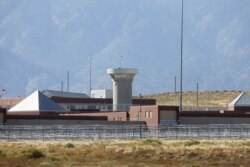Joaquin Guzman, the convicted Mexican drug lord known as "El Chapo," has been transferred to a "Supermax" prison in Colorado from which no one has ever escaped, the U.S. Bureau of Prisons said in a statement Friday.
Guzman was sentenced to life in prison plus 30 years on Wednesday in a federal court in Brooklyn after a jury convicted him of drug trafficking and engaging in multiple murder conspiracies as a top leader of the Sinaloa Cartel, one of Mexico’s largest, most violent drug trafficking organizations.
Before he was finally captured in 2016, Guzman twice escaped maximum-security prisons in Mexico.
"We can confirm that Joaquin Guzman is in the custody of the Federal Bureau of Prisons at United States Penitentiary (USP) Administrative Maximum (ADX) Florence, located in Florence, Colorado," the U.S. Bureau of Prisons said in its statement.
The Bureau of Prisons declined to comment further.
Guzman was whisked away early Friday from a secret location in New York, on his way to the Supermax prison in Florence, his attorney, Jeffrey Lichtman, told the Denver Post.
The prison is about 115 miles (185 km) south of Denver and opened in 1994. It has about 375 inmates.
Guzman joins a long list of notorious criminals there. They include "Unabomber" Ted Kaczynski, Sept. 11 conspirator Zacarias Moussaoui, Terry Nichols from the 1995 Oklahoma City bombing, "Shoe Bomber" Richard Reid, Boston Marathon bomber Dzhokhar Tsarnaev and Ramzi Yousef from the 1993 World Trade Center bombing in New York.
The Colorado Supermax prison is nicknamed "Alcatraz of the Rockies" after the San Francisco prison whose inmates included the gangsters Al Capone and George "Machine Gun" Kelly, as well as Robert Franklin Stroud, known as the Birdman of Alcatraz.
Like other prisoners, Guzman will likely be confined for around 23 hours a day to a solitary cell that has a narrow window about 42 inches (107 cm) high and angled upward so only the sky is visible.
He will be able to watch TV in his cell, and will have access to religious services and educational programs.
Special restrictions are used to ensure that inmates cannot exert influence or make threats beyond prison walls. Prisoners cannot move around without being escorted. Head counts are done at least six times a day.






